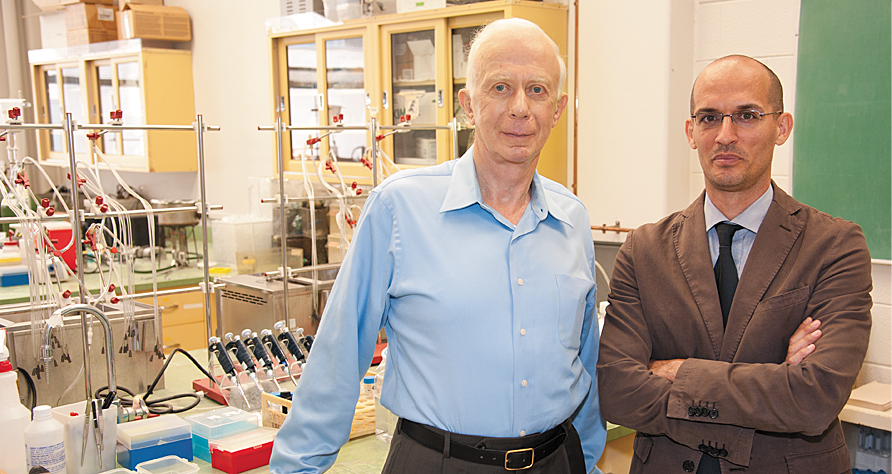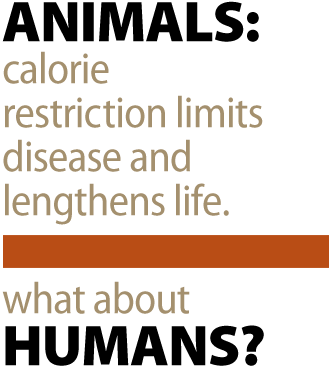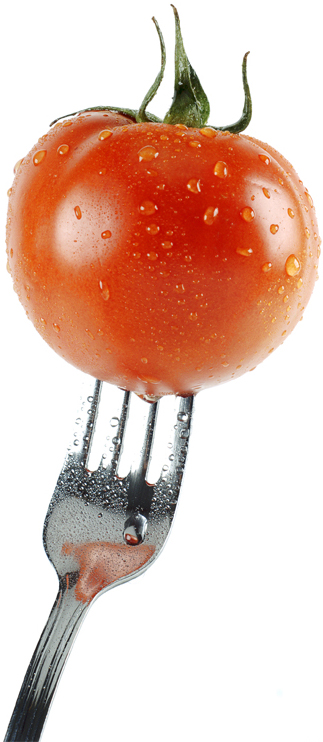Attorney and fitness aficionado Joseph Cordell has practiced calorie restriction since 2002. Here, for example, he eats a typical lunch topped by an apple peel — just the peel.
Photo by Robert Boston
BY JIM DRYDEN
Studies routinely suggest that more exercise and lower calorie intake can reduce risk for chronic disease, but some people take that notion much further. They believe that we could live a lot longer if we ate a lot less.
For nearly 20 years, a growing number of individuals have been severely restricting their caloric intake with the goal of significantly lengthening their lives. In fact, the Calorie Restriction (CR) Society website mentions age 120 as a target.
Members of the society refer to themselves as CRONies (Calorie Restriction with Optimal Nutrition). They aren’t, they say, promoting anorexia. Rather, they work diligently to get all of the vitamins and nutrients they need without consuming calories they don’t. Whereas a healthy man might normally eat about 2,500 calories per day, practitioners of CR shoot for 1,800. Instead of 2,000 calories, women consume 1,500 to 1,700 calories per day.
Many basic health practices — such as eating a healthy diet and getting regular exercise — can reduce the risk of premature death. But that’s not the same thing as living to be 120 years old.

Extending LIFE SPAN
It’s important to note, however, that most of the scientific studies on calorie restriction have been done in animals; it’s not yet known whether CR extends life in people. Researchers at the School of Medicine are looking for answers.
“Some of our original findings were almost accidental,” says John O. Holloszy, MD, professor of medicine. “We were studying rats to look at the effects of diet and exercise and, as expected, we found that sedentary rats that ate a standard diet had the shortest average life spans. Meanwhile, the rats that exercised by running on a wheel lived longer, but the animals on calorie restriction lived even longer still.”
And it wasn’t just a little longer. Some animal studies have shown life span increases of 50 percent or more.
“But a key difference between those animal studies and what we’re likely to find in humans is that the animals spend their entire lives on a calorie-restricted diet,” says Holloszy. “Most of the people who take up calorie restriction eat a standard diet for the first several decades of their lives and don’t begin restricting calories until much later. We don’t know yet whether they start too late to provide the dramatic effects on longevity that we’ve seen in animals.”

Limiting AGING
To find out, Holloszy and colleague Luigi Fontana, MD, PhD, have been looking at markers of aging in people on CR. They’ve studied CRONies and have looked at changes in people who were randomized to consume a calorie-restricted diet for just a few months. They’ve compared the effects of endurance exercise to the effects of CR, looking at markers of inflammation, “primary aging” (maximal life span) and “secondary aging” (age-related diseases that prevent a person or animal from reaching maximal life span).
What they’ve found is that a healthy diet and regular exercise are very effective at limiting risks associated with secondary aging, similar to results from the animal studies.
“About 30 percent of the animals on calorie restriction died at an advanced age without any of the diseases normally related to aging,” says Fontana, associate professor of medicine at Washington University and an investigator at the Istituto Superiore di Sanità in Rome. “In contrast, among animals on a standard diet, the great majority (94 percent) develop and die of one or more chronic diseases.”
Animals on calorie restriction still die eventually, but they don’t get sick first. And calorie restriction goes farther by also affecting markers associated with primary aging. The same thing appears to be true in people. For example, ultrasound examinations have shown that the hearts of people on calorie restriction are more elastic and efficient than those of age- and gender-matched control subjects. They also have lower markers of inflammation. The changes seem to be related to the CR diet, rather than to body weight.
“Many of the changes we’ve observed are due to lower energy intake, rather than to leanness,” Fontana says. “We’ve found that although exercise helps prevent many problems that can cut life short — such as obesity, diabetes and cardiovascular disease — only CR appears also to influence primary aging.”
Translating DISCOVERIES
Exactly how CR has its impact is the focus of ongoing studies. Fontana, Holloszy and colleague Marco Colonna, MD, professor of pathology and immunology and of medicine, are investigating metabolic, heart and immune function, as well as other changes related to CR.
All three have conducted research funded by the Longer Life Foundation, a group that supports pilot studies related to longevity.
“The School of Medicine and the Reinsurance Group of America co-sponsor the Longer Life Foundation (longerlife.org), an innovative model of a productive way that academics and industry can collaborate to help science and medicine move forward,” says Samuel Klein, MD, the Danforth Professor of Medicine and Nutritional Science and director of the university’s Longer Life Center.
Despite their findings, the researchers aren’t ready to recommend that the rest of us drastically cut our calories.
“I don’t really hope to extend life spans to 120 years,” says Fontana. “The average lifespan in Western countries is about 80 years, but there are too many people who are only healthy until about age 50. We want to translate our discoveries about calorie restriction and related genetic and physiologic changes to close the gap between ‘health span’ and life span.”

John O. Holloszy, MD, left, and Luigi Fontana, MD, PhD, are leading research efforts aimed at determining whether calorie restriction can slow the progress of aging and lengthen life in humans.








